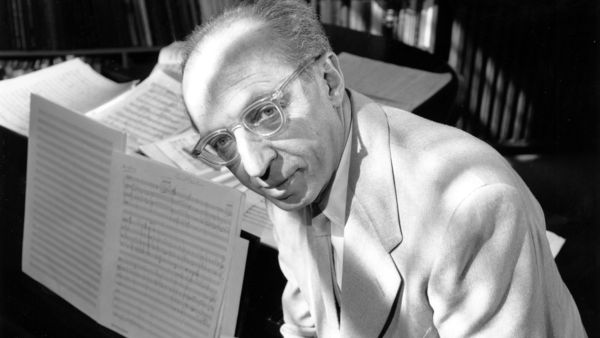In Celebration of the Human Voice - The Essential Musical Instrument
Home | Doo Wop | Barbershop | World | Contemporary | Christian | Vocal Jazz | Choral | Christmas | Instructional | Arrangements
Classical | Opera | Musicals | Personality | Young Singers | Disney | Videos | Songs | The Artists

Aaron Copland Biography

Click Here for Sheet Music and Songbook Vocal Arrangements
Copland born in Brooklyn, New York. Of Russian Jewish descent, he spent his childhood living above his parents' Brooklyn shop. Although his parents never encouraged or directly exposed him to music, at age fifteen he had already taken an interest in the subject and aspired to be a composer. His music education included time with Leopold Wolfsohn and Rubin Goldmark, also one of George Gershwin's teachers, and with Nadia Boulanger in Paris from 1921. Upon his return from his studies in Paris, he decided that he wanted to write works that were 'American in character' and thus he chose jazz as the American idiom. His first significant work was the necromantic ballet Grohg which contributed thematic material to his later Dance Symphony. Other major works of his first (austere) period include the Short Symphony (1933), Music for Theater (1925) and Piano Variations (1939). This jazz inspired period was brief, however as his style evolved toward the goal of writing more accessible works. Many composers rejected the notion of writing music for the elite during the depression, thus the common American folklore served as the basis for his work along with revival hymns, cowboy and folk songs. Copland's second (vernacular) period began around 1936 with Billy the Kid and El Salon Mexico. Perhaps Copland's most famous work, Fanfare for the Common Man, scored for brass and percussion was written in 1942 at the request of the conductor Eugene Goossens. The fanfare was also used as the main theme of the fourth movement of Copland's Third Symphony. The same year Copland wrote Lincoln Portrait which became popular with a larger amount of the public leading to a strengthing of his association with American music. He was commissioned to write a ballet, Appalachian Spring, which later he arranged as a popular orchestra suite. Copland was an important contributor to the film score genre. Several of the themes he created are encapsulated in the suite, Music for Movies, and his score for the film of Steinbeck's novel, The Red Pony, one of Copland's favourite scores, was given a suite of its own. Having defended the Communist Party USA during the 1936 presidential election, Copland was investigated by the FBI during the red scare of the 1950s. In 1953, his music was pulled from President Eisenhower's inaugural concert due to the political climate; that same year Copland testified before U.S. Congress that he was never a Communist. The investigation went inactive in 1955 and was closed in 1975. Copland's membership in the party was never proven. Aaron Copland died in his home in Peekskill, New York. Sheet Music Series |
Select a Category |
Want to Sing? - Find a Chorus Near You
List of Choruses by State | List of Choruses by City
